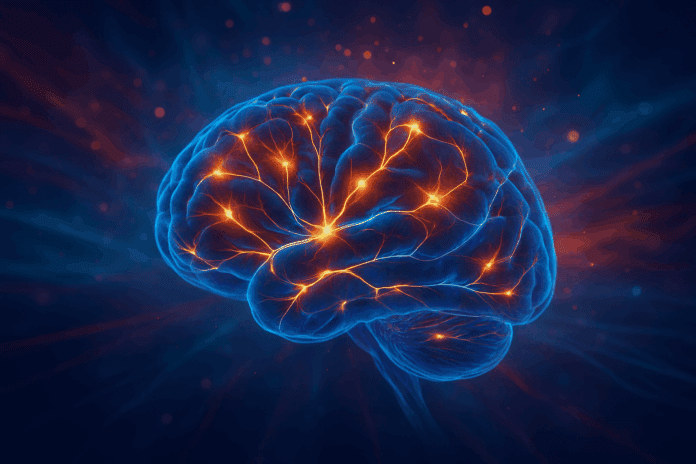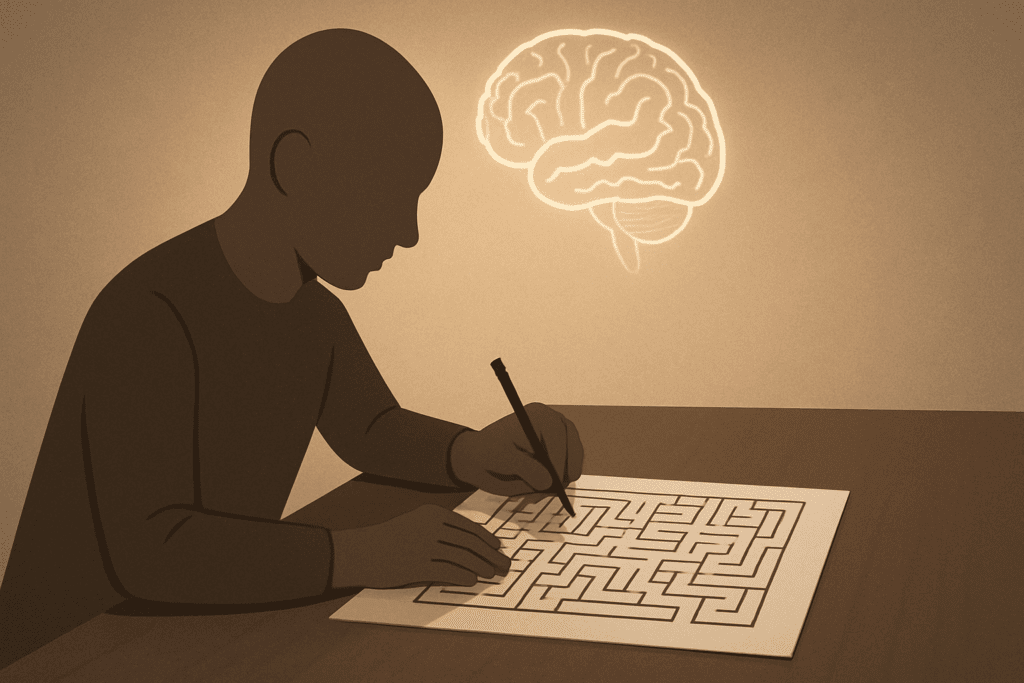
Understanding the Foundations of Cognitive Training
What is cognitive training? Cognitive training, often called brain training or neurocognitive rehabilitation, is a structured program of mental exercises aimed at enhancing specific brain functions. It is grounded in the science of neuroplasticity—the brain’s remarkable ability to reorganize and form new neural connections throughout life. Through targeted mental stimulation, cognitive capabilities such as memory, attention, processing speed, and executive function are not fixed traits but can be strengthened and improved. By engaging in carefully designed activities, individuals can optimize brain performance and support lifelong cognitive health.
Unlike passive activities, cognitive training requires active engagement. The exercises are typically repetitive and progressively challenging to ensure continual adaptation by the brain. These training methods range from paper-and-pencil tasks to sophisticated software platforms designed to track and optimize performance over time. In both clinical and non-clinical settings, cognitive training has gained traction not only for its potential therapeutic effects but also as a proactive tool to support mental sharpness across the lifespan.
The scientific roots of cognitive training extend back to rehabilitation efforts for stroke and brain injury patients. As research advanced, interest grew in applying similar techniques to healthy individuals seeking to preserve or enhance mental acuity. Today, cognitive training programs are widely marketed to older adults, students, professionals, and even children with learning difficulties. While enthusiasm is high, it remains essential to critically examine the evidence: how do cognitive exercises work, and to what extent can they impact mental health outcomes?
You may also like: Boost Brain Power Naturally: Evidence-Based Cognitive Training Activities and Memory Exercises That Support Long-Term Mental Health
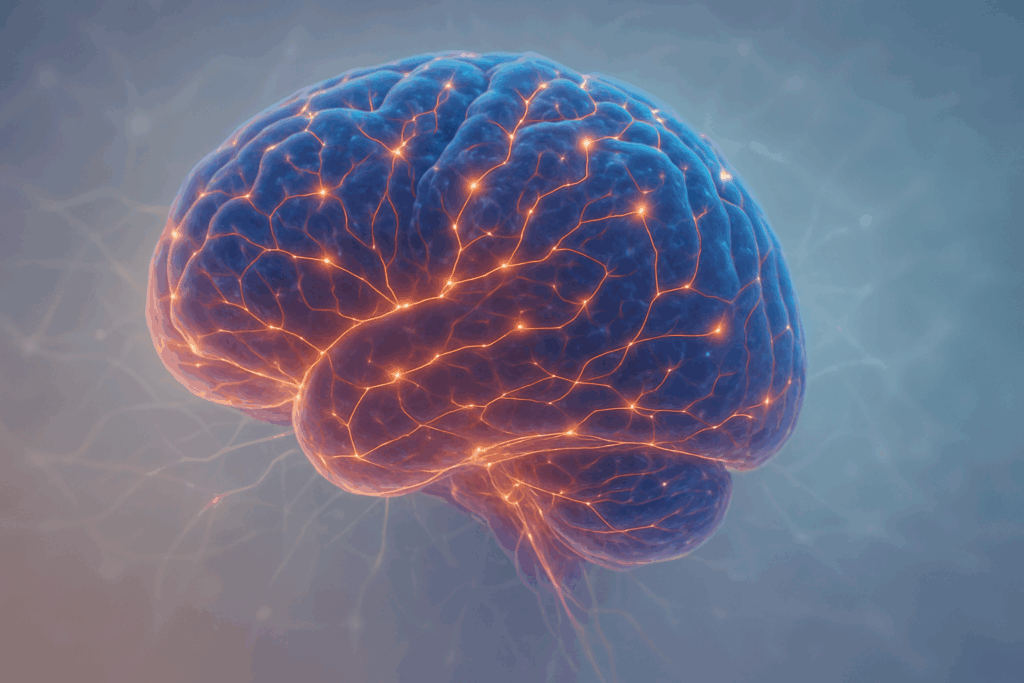
The Science Behind How Cognitive Exercises Work
To understand how cognitive exercises work, we must first explore the mechanisms of neuroplasticity. When the brain is exposed to repeated cognitive challenges, it undergoes structural and functional changes. Synaptic connections are strengthened, new pathways form, and underused areas may be repurposed. These adaptations allow for improved mental efficiency and resilience. For instance, training working memory through specific tasks can lead to measurable changes in both behavior and brain activity, particularly in the prefrontal cortex.
Moreover, cognitive training tends to be domain-specific, meaning that improvement is often observed in the exact skill being practiced. A memory game may enhance short-term recall but not necessarily reasoning or verbal fluency. This specificity raises questions about the generalizability of brain training—does improvement in one area translate to better mental health or broader cognitive function?
Emerging research suggests that, under the right conditions, cognitive training can induce near-transfer (improvement in similar tasks) and in some cases far-transfer (improvement in dissimilar tasks or real-world function). These effects are most robust when training is personalized, sustained over time, and paired with real-life applications. Thus, cognitive training may offer more than just entertainment—it can serve as a tool for reinforcing adaptive cognitive habits.
Importantly, how cognitive exercises work also depends on consistency, difficulty progression, and individual engagement. Passive or overly simple tasks are less likely to stimulate meaningful change. The most effective programs incorporate feedback loops, adaptive difficulty, and performance monitoring. By doing so, they keep users in the “zone of proximal development,” where learning is neither too easy nor too hard, encouraging continued growth.

Do Brain Games Improve Mental Health? Separating Hype from Evidence
The popularity of brain games—commercial cognitive training programs delivered via apps or online platforms—has exploded in recent years. Proponents claim these games can improve memory, sharpen attention, and even ward off cognitive decline. But the question remains: do brain games improve mental health, or are these claims overstated?
From a scientific standpoint, the answer is nuanced. Some studies demonstrate modest improvements in attention and working memory after consistent brain game use, particularly among older adults. There is also preliminary evidence suggesting reduced depressive symptoms when cognitive training is used in conjunction with traditional therapies. However, the improvements often do not generalize far beyond the trained tasks, leading skeptics to argue that brain games may not significantly enhance real-world cognitive functioning.
Despite this, the structured nature of brain games provides cognitive engagement, which can contribute positively to emotional well-being. Individuals who participate regularly often report increased confidence in their cognitive abilities, which can mitigate feelings of helplessness or anxiety about aging. These psychological benefits may indirectly support mental health, even if the games themselves are not a panacea for cognitive disorders.
Furthermore, the effectiveness of brain games may depend on the user. Those with mild cognitive impairment, early-stage dementia, ADHD, or mood disorders may benefit more significantly from structured cognitive engagement. When used as part of a comprehensive mental health strategy, brain games can complement therapy, physical activity, and social engagement. However, they should not replace evidence-based treatments or be viewed as standalone interventions.
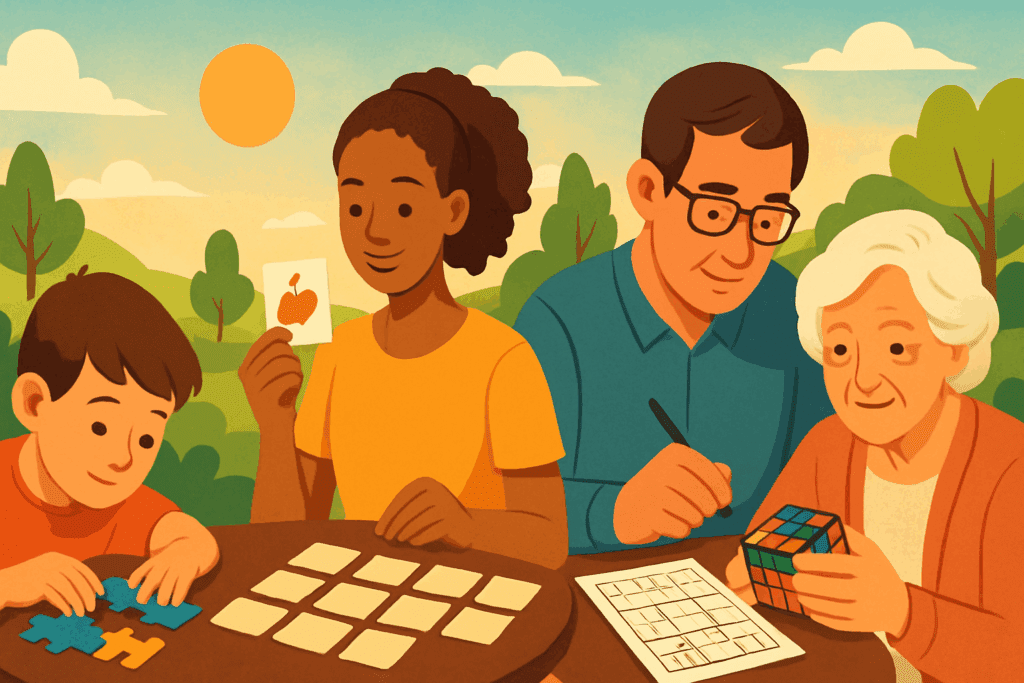
Do Brain Games Work Across Age Groups and Cognitive Conditions?
The question “do brain games work” becomes particularly important when considering their impact across different populations. For young adults and students, brain games may serve as tools to bolster study habits, attention, and memory—skills crucial for academic performance. While the cognitive gains might be modest, they can still offer meaningful support when combined with good sleep, exercise, and effective learning strategies.
In middle-aged adults, the focus often shifts toward preserving cognitive function amid stress and multitasking demands. Cognitive training in this demographic may improve processing speed, attentional control, and task-switching ability. These changes, although subtle, can translate to enhanced workplace performance and reduced mental fatigue.
Among older adults, the appeal of brain games lies in their potential to delay cognitive decline. Although no program has conclusively prevented dementia, several studies indicate that older adults who engage in regular cognitive exercises show slower declines in memory and reasoning. Additionally, these games can help maintain mental engagement and promote a sense of routine and purpose, which are essential for emotional well-being in later life.
For individuals with diagnosed cognitive conditions such as mild cognitive impairment or ADHD, the effects of brain games may be more pronounced. In these cases, targeted cognitive training can complement clinical interventions by reinforcing executive function, attention regulation, and short-term memory. Clinical trials have even explored the use of brain games as part of digital therapeutics, providing structured cognitive stimulation with measurable outcomes.
Do Mind Games Improve Mental Health Through Psychological Engagement?
While the terms “brain games” and “mind games” are often used interchangeably, the latter can also refer to more strategic, logic-based, or introspective tasks such as puzzles, riddles, or problem-solving scenarios. So, do mind games improve mental health through their unique blend of cognitive and emotional engagement?
In many cases, yes. Engaging with mind games can foster a sense of accomplishment, reduce stress, and promote relaxation. These games stimulate mental faculties in a way that encourages sustained focus and mindfulness, which are both protective factors against anxiety and depression. For example, completing a complex crossword puzzle can evoke a rewarding sense of mastery, enhancing mood and self-esteem.
Mind games can also serve as informal cognitive behavioral tools. They promote logical thinking, delay gratification, and often require consideration of multiple perspectives—all skills that are valuable in emotional regulation and interpersonal communication. Unlike passive forms of entertainment, these activities demand mental agility and can help break cycles of rumination or negative thought patterns.
In group settings, mind games like strategy board games or escape room challenges foster social interaction and cooperation. These elements are strongly correlated with improved mood, lower stress levels, and even enhanced immune function. Social mind games can also help combat isolation, particularly among older adults, by creating opportunities for meaningful engagement and cognitive stimulation.
Thus, while the term “mind games” might carry playful or even manipulative connotations in everyday language, their structured and challenging forms offer real benefits. When integrated into a balanced lifestyle that includes physical activity, social connection, and mental health support, mind games can indeed contribute to better mental health outcomes.

What Is Cognitive Training in Clinical and Preventive Care?
To fully grasp what cognitive training is, one must consider both its clinical and preventive dimensions. In clinical settings, cognitive training is often delivered by neuropsychologists, occupational therapists, or speech-language pathologists. These professionals use standardized assessments to identify cognitive deficits and tailor training programs to rehabilitate specific skills. Common applications include stroke recovery, traumatic brain injury rehabilitation, and therapy for neurological conditions such as Parkinson’s disease or multiple sclerosis. Clinical cognitive training typically emphasizes functionality.
The goal is not just to improve test scores, but to enhance real-life abilities—such as managing finances, navigating environments, or remembering appointments. The training often involves real-world simulations, combined with adaptive software and therapist-guided sessions. These interventions are grounded in evidence-based protocols and are usually integrated into broader therapeutic plans.In preventive contexts, cognitive training aims to preserve or enhance mental function before significant decline occurs.
This approach is becoming increasingly popular among aging populations and those with family histories of neurodegenerative diseases. Preventive cognitive training may include app-based programs, group workshops, or home-based regimens that challenge users to complete progressively difficult tasks in memory, logic, and processing speed.
Health practitioners are beginning to recognize the value of prescribing cognitive exercises as part of lifestyle medicine. Just as diet and physical activity are encouraged for cardiovascular health, cognitive training is being promoted for brain health. This holistic view emphasizes that mental acuity is not a fixed trait, but a skill that can be nurtured through deliberate practice.
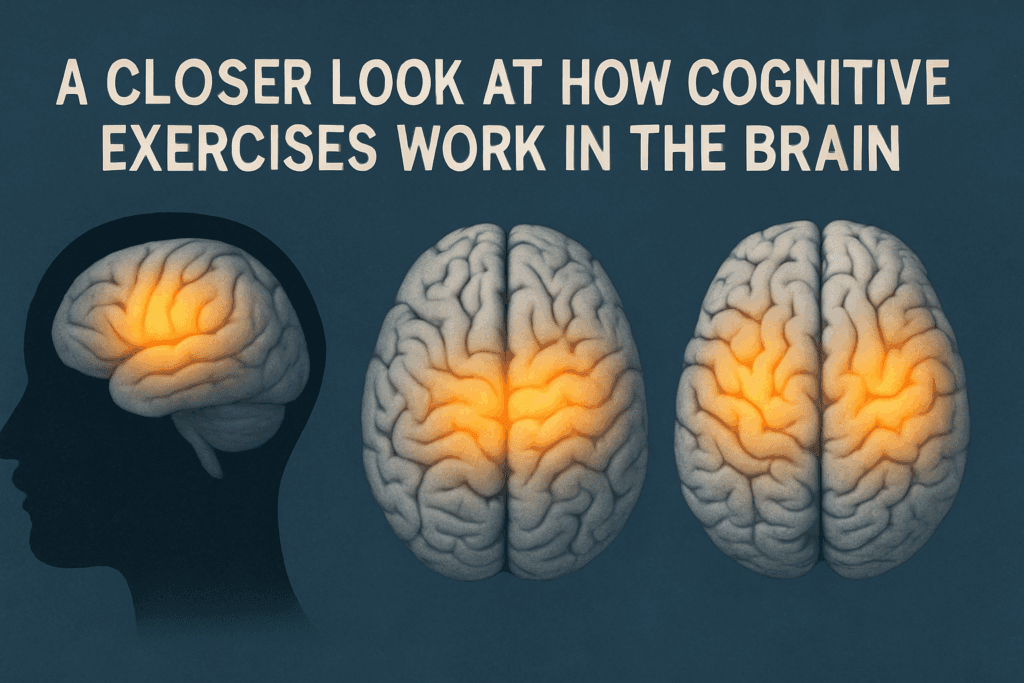
A Closer Look at How Cognitive Exercises Work in the Brain
Returning to the central question of how cognitive exercises work, neuroscientific research offers compelling insights. Functional MRI (fMRI) and electroencephalogram (EEG) studies reveal that cognitive training activates and strengthens specific neural circuits. For example, working memory tasks typically engage the dorsolateral prefrontal cortex and parietal regions—areas associated with high-level reasoning and spatial processing.
Repeated engagement in these tasks leads to increased neural efficiency, meaning the brain can perform tasks with less energy expenditure. Additionally, new dendritic growth and synaptic plasticity have been observed in animal models subjected to enriched environments and cognitive challenges, suggesting that similar mechanisms may be at play in humans.
Moreover, engaging in a variety of cognitive exercises appears to have a compounding effect. Switching between memory tasks, logic puzzles, and spatial games recruits multiple brain networks, enhancing overall cognitive resilience. This cross-training effect mirrors the principles of physical fitness, where a diverse regimen yields more robust performance than repetitive activity in a single domain.
Sleep, nutrition, and emotional well-being also influence how cognitive exercises work. Adequate sleep consolidates memory and enhances learning capacity, while nutrients like omega-3 fatty acids and B vitamins support neural integrity. Stress management is equally critical; chronic stress can impair the very brain regions cognitive training seeks to enhance. Thus, for cognitive training to be maximally effective, it must be integrated into a lifestyle that supports overall brain health.
Frequently Asked Questions: What Is Cognitive Training and Do Brain Games Improve Mental Health?
1. Can cognitive training help reduce anxiety or emotional stress?
Yes, cognitive training can play a supportive role in managing anxiety and emotional stress, particularly when combined with evidence-based therapeutic approaches. While traditional treatment for anxiety often includes cognitive behavioral therapy and medication, cognitive training offers a complementary way to retrain attention, focus, and executive function. For individuals with anxiety, tasks that strengthen cognitive control can reduce tendencies toward rumination and emotional reactivity. Understanding how cognitive exercises work in this context reveals their ability to redirect attention away from anxiety-inducing thoughts and toward goal-directed tasks. These exercises can also improve working memory and processing speed, which are often compromised during periods of chronic stress. While they’re not a standalone cure, cognitive exercises may build mental resilience, allowing the brain to process information more effectively under emotional strain. Individuals who consistently engage in such activities often report improved clarity and a greater sense of control over their thoughts, both of which are beneficial in reducing anxiety levels.
2. How do brain games impact daily decision-making and judgment?
Engaging in brain games that challenge logic, pattern recognition, and strategic thinking can subtly enhance decision-making in everyday scenarios. The repeated use of cognitive functions during gameplay strengthens neural circuits involved in executive function and impulse control. For example, individuals who regularly use decision-making games may find themselves more patient and methodical when facing choices under pressure. These games simulate environments where delayed gratification and strategic risk assessment are rewarded, which parallels real-life situations such as financial planning or conflict resolution. Moreover, do brain games work in this context? Yes, when practiced regularly, they train the brain to weigh options more thoughtfully. By encouraging reflection over impulse, brain games can gradually condition users to apply more logic and less emotion in high-stakes decisions. Over time, this translates to more consistent, rational, and goal-aligned behavior in daily life, especially when paired with mindfulness or journaling practices that reinforce self-awareness.
3. What role does cognitive training play in supporting healthy aging?
Cognitive training has become increasingly relevant as part of healthy aging strategies. As individuals grow older, natural declines in memory, attention, and mental flexibility become more common. Understanding what cognitive training offers in this space is crucial—it provides a proactive way to support cognitive vitality. Engaging in structured mental exercises stimulates the brain’s neuroplasticity, helping to delay the onset of cognitive decline. These programs often target specific functions such as working memory and problem-solving, which are critical for maintaining independence. Furthermore, how do cognitive exercises work for older adults? They provide a scaffold for maintaining mental routines, enabling seniors to stay socially, mentally, and emotionally active. Participation in cognitive training has also been linked with reduced risk of dementia when combined with other lifestyle interventions like exercise and social engagement. As a result, these activities can serve not just as tools for maintenance but as empowering rituals that provide structure and purpose during retirement.
4. Are brain games useful for individuals recovering from brain injury?
Yes, brain games can be highly beneficial during rehabilitation from traumatic brain injury (TBI), provided they are used under the guidance of a medical professional. In clinical rehabilitation, the question “do brain games work” takes on heightened significance, as these tools may assist in regaining lost skills or forming new compensatory strategies. Cognitive tasks that challenge short-term memory, sequencing, and attention are often tailored to the patient’s recovery stage and unique deficits. These exercises can serve as low-risk, adaptive interventions that support both physical and psychological healing. Additionally, mind games that emphasize planning and flexibility help retrain executive functions, which are often impaired after TBI. The emotional benefits should not be overlooked either; these tasks offer structure and motivation during a time when identity and autonomy may feel disrupted. With proper supervision and customization, brain games can reinforce the neural pathways necessary for functional recovery and long-term independence.
5. How do mind games improve mental health in social or group settings?
Group-based mind games, such as collaborative puzzles or strategy board games, offer mental stimulation while also fostering social connection—an often overlooked factor in mental health. Social isolation is a known risk factor for depression and cognitive decline, particularly in older adults. So, how do mind games improve mental health in these contexts? They activate cognitive processes while also encouraging laughter, communication, and emotional bonding. Unlike solitary cognitive tasks, these interactive games enhance empathy, teamwork, and verbal fluency, all of which contribute to psychological well-being. Additionally, structured social interaction through gameplay can reduce stress hormones and promote the release of oxytocin, a neurochemical associated with trust and emotional warmth. These games serve as non-threatening, low-pressure ways to engage with others, making them particularly valuable for individuals with social anxiety or mild cognitive impairment. In this way, the mental health benefits go beyond cognition to encompass emotional and interpersonal dimensions as well.
6. What’s the difference between short-term and long-term effects of brain games?
The immediate effects of brain games often include heightened alertness, quicker reaction times, or a temporary improvement in working memory. However, the more impactful outcomes tend to emerge over longer periods of consistent use. Understanding how cognitive exercises work over time highlights their capacity to create lasting neural adaptations. Short-term benefits may be motivating, but it’s the long-term effects—like improved task-switching ability, better information retention, and enhanced emotional regulation—that offer transformative value. Longitudinal studies suggest that individuals who engage in cognitive training for several months can experience meaningful improvements in cognitive control and mental endurance. This distinction between transient boosts and durable change is important when asking, “do brain games work?” The answer depends on duration, consistency, and the complexity of the tasks. It’s the cumulative exposure to diverse mental challenges that reshapes cognitive resilience, making sustained practice a cornerstone of effective training.
7. Can cognitive training benefit children and adolescents, or is it only for adults?
Cognitive training isn’t just for adults—it has significant implications for children and adolescents as well. During childhood and adolescence, the brain undergoes rapid growth and development, making this an ideal period for targeted cognitive stimulation. So, what is cognitive training in this age group? It often involves games and exercises designed to improve attention span, impulse control, and memory, especially for children with ADHD or learning challenges. Importantly, these tools can also reinforce classroom learning by strengthening foundational skills like sequencing, auditory processing, and mental math. How do cognitive exercises work for younger brains? They capitalize on the heightened neuroplasticity of youth, enabling quicker and more robust gains in cognitive efficiency. By promoting mental flexibility early on, these interventions may also reduce the risk of future academic struggles or emotional difficulties. Parents and educators are increasingly recognizing the value of these methods, particularly when integrated into a broader educational or behavioral plan.
8. Are there risks or downsides to relying too heavily on cognitive training apps?
While cognitive training apps offer convenience and personalized metrics, overreliance on them can lead to diminishing returns or even unintended consequences. The primary concern is that many commercial apps lack scientific validation and focus more on engagement than meaningful outcomes. So when we ask, “do brain games work,” it’s essential to scrutinize the quality and design of the program. Relying exclusively on app-based training may also narrow the cognitive stimulation a person receives, missing out on the benefits of real-world problem-solving, physical movement, and social interaction. Furthermore, users might develop a false sense of security, believing that the app alone is sufficient for mental well-being. A balanced approach—one that includes diverse mental activities, regular exercise, good nutrition, and social connection—is far more sustainable and effective. Just as physical fitness requires varied routines, mental fitness thrives on diverse cognitive inputs, not just repetitive screen-based exercises.
9. How can professionals tailor cognitive training to individual needs?
Personalization is key to maximizing the effectiveness of cognitive training. Mental health professionals and cognitive therapists begin by assessing the individual’s cognitive profile through standardized tests or behavioral observations. Once specific strengths and weaknesses are identified, a targeted program can be designed to address those areas. For example, someone struggling with distractibility might focus on attention-control tasks, while a person with memory issues could benefit from chunking and recall exercises. Understanding how cognitive exercises work in these cases reveals the importance of matching challenge level to ability—a principle known as the “zone of proximal development.” Professionals may also integrate motivational elements like goal-setting and feedback loops to sustain engagement. Whether for rehabilitation or optimization, this tailored approach ensures that the training remains relevant, effective, and responsive to the individual’s evolving needs.
10. What future trends are shaping the world of cognitive training and brain games?
The future of cognitive training is being shaped by emerging technologies such as virtual reality (VR), artificial intelligence (AI), and biofeedback integration. These innovations promise to make training more immersive, adaptive, and neurologically precise. For instance, AI-driven platforms can analyze user performance in real time and adjust task complexity accordingly, ensuring that users remain in the optimal learning zone. Additionally, researchers are exploring how do brain games work in conjunction with neurofeedback, where individuals receive real-time data on their brain activity to fine-tune performance. Similarly, VR environments can simulate complex, real-life scenarios to test cognitive flexibility in more dynamic ways than traditional apps. As we continue to explore how do mind games improve mental health, these advancements offer more comprehensive and personalized solutions. The integration of multidisciplinary science—combining psychology, neuroscience, and technology—suggests a bright future where cognitive training evolves from digital novelty to essential mental healthcare.
Conclusion: The Evidence-Based Potential of Brain Games and Cognitive Training for Mental Health
As we consider the question “do brain games improve mental health” in the context of real-world application, the evidence points to a cautiously optimistic yes—with important caveats. Brain games and cognitive training offer measurable benefits in attention, memory, and executive function, particularly when used consistently and as part of a comprehensive mental wellness strategy. However, these tools are not magical fixes. Their effectiveness is contingent on thoughtful application, individual engagement, and a supportive environment.
Understanding what cognitive training is goes far beyond app-based exercises. It encompasses a range of interventions—from clinical rehabilitation to proactive wellness strategies—that leverage the brain’s natural capacity for growth. How cognitive exercises work is a question best answered through the lens of neuroplasticity, personalization, and scientific rigor.
For those asking do mind games improve mental health,” the answer lies in the multidimensional benefits they offer: cognitive stimulation, emotional resilience, and social connection. These are the pillars of lasting mental well-being.
In summary, brain games do work—but their value depends on how they are used, for whom, and in what context. With a growing body of research and a deeper understanding of cognitive science, these tools can play a meaningful role in promoting mental health across the lifespan. Whether you’re recovering from a cognitive setback or seeking to maintain mental agility, structured cognitive training may be one of the most empowering steps you can take for long-term brain health.

